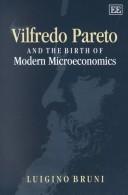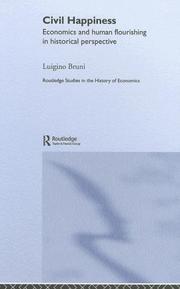| Listing 1 - 10 of 34 | << page >> |
Sort by
|

ISBN: 1840645326 9781840645323 Year: 2002 Publisher: Cheltenham: Elgar,
Abstract | Keywords | Export | Availability | Bookmark
 Loading...
Loading...Choose an application
- Reference Manager
- EndNote
- RefWorks (Direct export to RefWorks)
Microeconomics --- Methodology of economics --- Economic schools --- Pareto, Vilfredo F.D. --- Economics --- Rational choice theory --- Methodology --- Pareto, Vilfredo, --- 330.101 --- -Rational choice theory --- 330.1543 --- Social choice --- Economic theory --- Political economy --- Social sciences --- Economic man --- Economische analyse. Economische methodologie. Economische onderzoeksmethoden--(theoretische economie) --- Pareto, Vilfredo --- 330.101 Economische analyse. Economische methodologie. Economische onderzoeksmethoden--(theoretische economie) --- Economics - Methodology --- Pareto, Vilfredo, - 1848-1923

ISBN: 0415326281 0203488113 9780415326285 9780203488119 9781134340477 9781134340514 9781134340521 9780415494106 Year: 2006 Publisher: London Routledge
Abstract | Keywords | Export | Availability | Bookmark
 Loading...
Loading...Choose an application
- Reference Manager
- EndNote
- RefWorks (Direct export to RefWorks)
Economists have long labored under the misapprehension that all humans exist as rational beings that find happiness in maximizing their personal utility. This impressive volume presents an historical review of the evolution of economic thought, from economic philosophy to contemporary mathematical economics, and its critique of how the human and social dimensions of economics have been lost in this evolutionary process. Essential reading for economists everywhere.
Political philosophy. Social philosophy --- Economic schools --- Economics --- Happiness --- Well-being --- Welfare (Personal well-being) --- Wellbeing --- Quality of life --- Health --- Wealth --- Gladness --- Emotions --- Cheerfulness --- Contentment --- Pleasure --- Behavioral economics --- Behavioural economics --- Psychological aspects --- Economic aspects --- History
Book
ISBN: 3030040828 303004081X Year: 2019 Publisher: Cham : Springer International Publishing : Imprint: Springer,
Abstract | Keywords | Export | Availability | Bookmark
 Loading...
Loading...Choose an application
- Reference Manager
- EndNote
- RefWorks (Direct export to RefWorks)
This book provides a systematic commentary on the first two books of the Bible: Genesis and Exodus. Drawing on these two essential books, it subsequently offers new readings of several issues relevant for today’s economic and social life. Western Humanism has its own founding cultural and symbolic codes. One of them is the Bible, which has for millennia provided a wealth of expressions on politics and love, death and economy, hope and doom. Biblical stories have been revived and reinterpreted by hundreds of generations, and have informed many of our most beautiful works of art, not to mention the dreams of children and adults alike. And they have given us hope during the many painful times of exile and oppression that we have gone through, and are going through still. Among the books of the Bible, in both the Jewish and Christian traditions, Genesis and Exodus represent the true foundation of biblical theology and anthropology, but in them we also find the roots of the culture of markets, money and commerce, which would go on to flourish during the Middle Ages and ultimately form the ‘spirit of capitalism’ (Max Weber) or the ‘religion of capitalism’ (Walter Benjamin) in the modern era. This book examines the Biblical foundations of our conception of social relations, and offers new insights on the present economic and social discourse. .
Salvation. --- Salvation --- Soteriology --- Economy of God --- Religion --- Christianity. --- Bible --- Theology. --- Economic history. --- Bible-Theology. --- Religion and sociology. --- Philosophy. --- History of Economic Thought/Methodology. --- Biblical Studies. --- Sociology of Religion. --- Religion and Society. --- Philosophy of Religion. --- Mental philosophy --- Humanities --- Religion and society --- Religious sociology --- Society and religion --- Sociology, Religious --- Sociology and religion --- Sociology of religion --- Sociology --- Economic conditions --- History, Economic --- Economics --- Bible—Theology. --- Religion—Philosophy. --- Economics—History. --- Bible—Study and teaching. --- History of Economic Thought and Methodology.
Book
ISBN: 9781000393552 1000393550 9780367762629 0367762625 9781000393606 1000393607 9780367762612 Year: 2021 Publisher: London, UK ; New York, NY : Routledge, Taylor & Francis Group,
Abstract | Keywords | Export | Availability | Bookmark
 Loading...
Loading...Choose an application
- Reference Manager
- EndNote
- RefWorks (Direct export to RefWorks)
"'Values-based organizations' are institutions, communities and NGOs which are inspired by a mission or a vocation - for these groups it is their ideals which are most important to them and economics does not have a way to incorporate that into its analysis. This book provides a short introduction to the economics of values-based organizations. The book opens with an analysis of some phenomena common to all organizations: the management of vulnerabilities in relationships and the role of incentives, especially in relation to loyalty. Turning to values-based organizations more specifically, the book explores the motivations of their members, how they retain their most motivated people, what happens when the ideals of the organization have perceived to have deteriorated, and the decisions made by those in charge, who focus on efficiency, oblivious to values and identities. The second part of the book explores the narrative dimensions of values-based organizations. 'Narrative capital' is a precious resource in many of these organizations, particularly through periods of crisis and change. But problems can also be caused if the second and later generations after the foundations continue to use the original narrative without enough innovation. Finally, the book discusses the gaps - the surpluses and misalignments - between people, their ideals and the organizations and how these can be managed. The book is written for academics, students and others interested in the role of values and ideals in organizations - economists, sociologist, business scholars, theologians, and philosophers"--
Values --- Economics --- Economic aspects. --- Moral and ethical aspects. --- Economic theory --- Political economy --- Social sciences --- Economic man --- Axiology --- Worth --- Aesthetics --- Knowledge, Theory of --- Metaphysics --- Psychology --- Ethics
Book
ISBN: 2375820312 9782375820315 Year: 2018 Publisher: Bruyères-le-Châtel: Nouvelle Cité,
Abstract | Keywords | Export | Availability | Bookmark
 Loading...
Loading...Choose an application
- Reference Manager
- EndNote
- RefWorks (Direct export to RefWorks)
Le travail n'est pas un acte de second rang dans la Bible ; bien des vocations se révèlent tandis que la personne vaque à ses occupations : Gédéon, Amos, les apôtres... Le Dieu biblique aime accompagner sa créature sur les routes poussiéreuses empruntées par tous. C'est la grande " laïcité " de la vie et de la foi exprimée par la Bible, où Dieu a une idée si grande et digne de l'homme qu'il le fait dialoguer avec les anges dans les champs, dans les ateliers, rendant ainsi les lieux de vie et de travail hautement spirituels.
Book
ISBN: 2853138305 9782853138307 Year: 2016 Publisher: Bruyères-le-Châtel: Nouvelle Cité,
Abstract | Keywords | Export | Availability | Bookmark
 Loading...
Loading...Choose an application
- Reference Manager
- EndNote
- RefWorks (Direct export to RefWorks)
Les réseaux sociaux, la mondialisation des marchés et de la finance ont imposé une mutation profonde dans les relations sociales, jusque dans l'économie et l'entreprise. Les conceptions innovantes doivent désormais tenir compte de nouvelles attentes en matière de rapports humains. On découvre "la puissance du fragile et du vulnérable" et l'action de "l'économie humaine et silencieuse".
Digital
ISBN: 9783030040826 Year: 2019 Publisher: Cham Springer International Publishing
Abstract | Keywords | Export | Availability | Bookmark
 Loading...
Loading...Choose an application
- Reference Manager
- EndNote
- RefWorks (Direct export to RefWorks)
This book provides a systematic commentary on the first two books of the Bible: Genesis and Exodus. Drawing on these two essential books, it subsequently offers new readings of several issues relevant for today’s economic and social life. Western Humanism has its own founding cultural and symbolic codes. One of them is the Bible, which has for millennia provided a wealth of expressions on politics and love, death and economy, hope and doom. Biblical stories have been revived and reinterpreted by hundreds of generations, and have informed many of our most beautiful works of art, not to mention the dreams of children and adults alike. And they have given us hope during the many painful times of exile and oppression that we have gone through, and are going through still. Among the books of the Bible, in both the Jewish and Christian traditions, Genesis and Exodus represent the true foundation of biblical theology and anthropology, but in them we also find the roots of the culture of markets, money and commerce, which would go on to flourish during the Middle Ages and ultimately form the ‘spirit of capitalism’ (Max Weber) or the ‘religion of capitalism’ (Walter Benjamin) in the modern era. This book examines the Biblical foundations of our conception of social relations, and offers new insights on the present economic and social discourse. .
Philosophy --- Religious studies --- Bible --- Christian theology --- Sociology of religion --- Sociology --- Methodology of economics --- Economic schools --- World history --- History --- bijbelstudie --- sociologie --- theologie --- filosofie --- geschiedenis --- godsdienst --- bijbel --- economische geschiedenis --- kapitalisme --- godsdienstfilosofie
Book
ISBN: 1349506788 Year: 2015 Publisher: London : Palgrave Macmillan UK : Imprint: Palgrave Pivot,
Abstract | Keywords | Export | Availability | Bookmark
 Loading...
Loading...Choose an application
- Reference Manager
- EndNote
- RefWorks (Direct export to RefWorks)
We must quickly learn how to live well in the world as it is today, including the realm of work. We need to learn a new vocabulary of economics and markets that is more suitable to understand the present world and that is likely to offer us the tools to act, and perhaps improve it as well.
Economic theory. --- Discourse analysis. --- Welfare economics. --- Behavioral economics. --- Lexicology. --- Macroeconomics. --- Economic Theory/Quantitative Economics/Mathematical Methods. --- Discourse Analysis. --- Social Choice/Welfare Economics/Public Choice/Political Economy. --- Behavioral/Experimental Economics. --- Lexicology/Vocabulary. --- Macroeconomics/Monetary Economics//Financial Economics.
Book
ISBN: 8831124293 9788831124294 Year: 2004 Publisher: Roma Città Nuova
Abstract | Keywords | Export | Availability | Bookmark
 Loading...
Loading...Choose an application
- Reference Manager
- EndNote
- RefWorks (Direct export to RefWorks)
Book
ISBN: 9788860890160 8860890160 Year: 2007 Publisher: Trento Il margine
Abstract | Keywords | Export | Availability | Bookmark
 Loading...
Loading...Choose an application
- Reference Manager
- EndNote
- RefWorks (Direct export to RefWorks)
| Listing 1 - 10 of 34 | << page >> |
Sort by
|

 Search
Search Feedback
Feedback About UniCat
About UniCat  Help
Help News
News